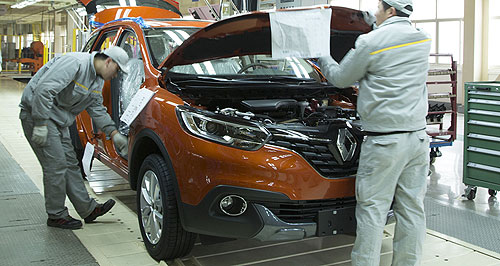Make / Model Search
News - MitsubishiMitsubishi deal will save billionsOnward and upward: Renault-Nissan Alliance chairman and CEO Carlos Ghosn is confident of the cost savings that its alliance with Mitsubishi will bring. Ghosn says new grouping will make 10 million vehicles, but volume not the main aim16 May 2016 By IAN PORTER NISSAN Motor Company newly acquired 34 per cent stake in Mitsubishi Motors Corporation (MMC) could save the two car-makers as much as $US4.5 billion ($A6.2b) on platform development over the normal product cycle, according to Renault-Nissan Alliance chairman and CEO Carlos Ghosn. The incorporation of Mitsubishi into the Renault-Nissan Alliance would create a group that produces about 10 million vehicles in 2016, which would effectively put the new alliance into the top three automotive companies globally, Mr Ghosn said in a teleconference on Friday. That output would put the French-Japanese group, whose largest shareholder is the French government with 19.7 per cent, on a par with Toyota Motor Corporation, General Motors and Volkswagen Group. Nissan makes about 4.1 vehicles a year, Renault/Dacia/Samsung builds 2.8 million and MMC 1.2 million a year, which totals approximately 8.1 million units. “The alliance will maximise volume, although it is not the objective,” Mr Ghosn said. “Economies of scale, increased competitiveness, and other initiatives will both reinforce and lead to volume increases.” Mr Ghosn said volume was not the principal objective behind the plan to pay ¥237 billion ($A2.9b) for a 34 per cent stake in Mitsubishi Motors Corporation (MMC). MMC will issue new shares to Nissan, which means all the original Mitsubishi group shareholders will stay on the MMC share register. “We will collaborate on product development,” Mr Ghosn said. “Product development has two parts, technical development and product development. The increased production volume would also allow the group to drive down prices from suppliers, he said. “For technological development, collaboration will become more and more common (as we did with Renault and Nissan), but the products will be different.” The key part of the planned collaboration would be the sharing of platforms as that would lead to savings counted in billions of dollars, according to Mr Ghosn. “A new platform costs in the region of $US500 million dollars ($A687 million). One platform usually lasts 15 years. “We have nine common platforms between MMC and Nissan. Investment in a platform, as I mentioned, is $US500 million. Instead of building our own platforms, we can use our partner’s platform.” This suggests that the new pairing could save as much as $US4.5 billion ($A6.2b) as the two companies replace the 18 separate platforms they now have with nine shared platforms. The savings would be shared between the two brands, as the company that developed the platform would receive a fee from the company that did not. “But this (fee) is much less than building one from scratch. So it’s a win-win. Customers don’t care about the platform. They do care about design, and the tuning of the car, amongst other things.” He said Nissan and Renault had been sharing platforms for some time but that the vehicles produced were very different. This platform sharing is done with the Koleos and the X-trail and the Kadjar and the Qashquai. “There is no cannibalisation,” he added. In the 2015 Renault annual report, Mr Ghosn said savings on joint platform development between Renault and Nissan in the last financial year had totaled €4.1 billion ($A6.3b), twice that achieved in 2010. At present MMC produces a little more than one million units a year while Nissan makes 4.1 million a year. Mr Ghosn said the savings on platform development would be much greater for MMC as it was smaller company. “Through the strengthened relationship, MMC will be able to grow faster. “If we are sharing some platforms, for example, with similar products, we may stop a platform at MMC, then the benefits will be much bigger for MMC. They no longer have the cost of the platform, they can share the Nissan platform to develop their branded products, paying Nissan a small fee to use that platform.” The other benefit of sharing platforms is that volumes will be bigger and savings will be available through the purchasing of materials and components for those platforms. Mr Ghosn said that the big shareholding in MMC meant that Nissan would actually benefit twice through this platform rationalisation. “Nissan wins twice, both through synergies as well as through its 34 per cent shareholding in MMC,” Mr Ghosn said, “giving us 34 per cent of their wins too”. Nissan has grabbed a bargain with its offer to buy new shares from MMC. It swooped on MMC when its share price was depressed by the latest scandal to engulf the company, the confession that it had rigged emissions testing results on its Japanese-market mini cars. MMC’s 2016 shares peak was ¥1043 ($A13.20) on April 1 but the price slumped after the latest revelation about emissions testing. Nissan will pay just ¥468.52 ($A5.93) for each of its MMC shares, which is even below Friday’s closing price of ¥565. Based on the closing price, Nissan is already $A619 million ahead on its MMC shareholding.  Read more16th of May 2016  Navara and Triton to share platformMitsubishi brand and factories will be maintained after Nissan takes big stake13th of May 2016  Nissan and Mitsubishi confirm tie-inStrategic alliance between Nissan and Mitsubishi goes official12th of May 2016  Nissan to buy major stake in Mitsubishi: reportTrouble-plagued Mitsubishi could reportedly get a boost from part-Nissan ownership |
Click to shareMitsubishi articlesResearch Mitsubishi Motor industry news |











Facebook Twitter Instagram